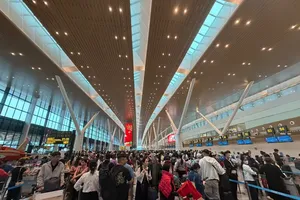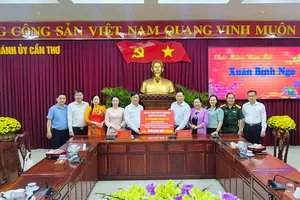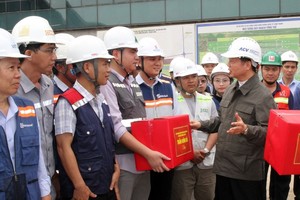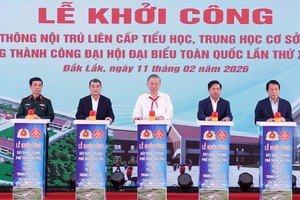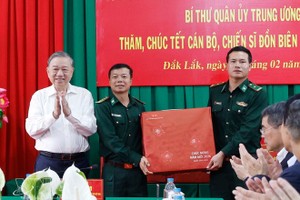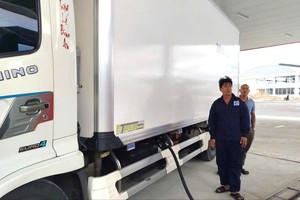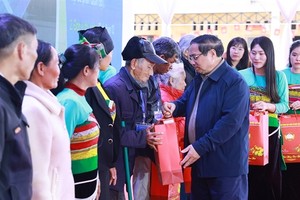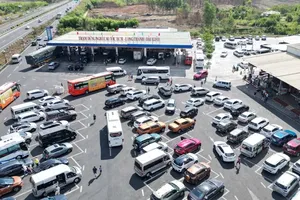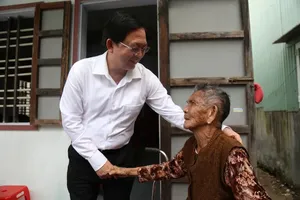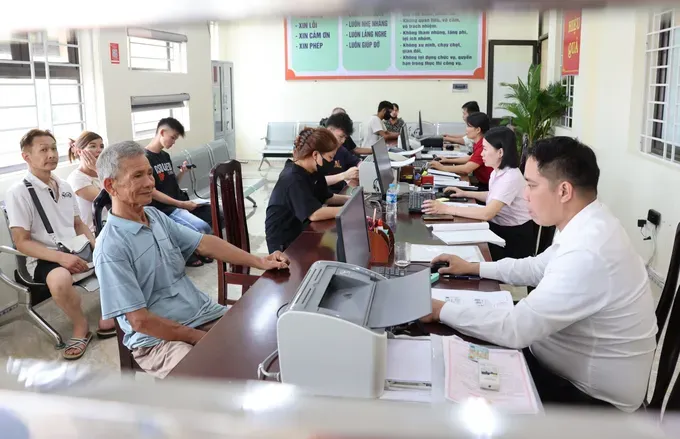
Following the rollout of the new two-tier local government model, Tan Trao Commune (Tuyen Quang Province) has, like the rest of the country, put the new model into motion. It’s a large area, spanning nearly 100km2 with a population of about 15,000. Yet, the commune government is now reportedly running on just 32 officials, civil servants, and non-specialized staff. It’s a classic case of fewer people, more work; but by all accounts, the public’s needs are still being met quickly and cleanly.
On a recent Monday morning, the commune’s Public Administration Service Center was busy. Residents arriving for paperwork, certifications, and land registration were all being guided attentively.
For resident Dam Van Thang from Ca Hamlet, the change is palpable. “Getting a ‘red book’ (land use right certificate) used to take people 3-4 trips of 30km. Now? It takes maybe 15 minutes. The staff here helped me, they explained everything clearly. What a huge relief!” he exclaimed.
To achieve this, Tan Trao Commune adopted a “right person, right job” mantra. Vice Chairman Hoang Van Canh said, “We evaluate our staff weekly. Anyone who can’t keep up gets transferred. We already replaced three people. It isn’t as a punishment, but to serve the public better.”
The biggest challenge is a lack of specialized expertise. After restructuring, former district officials were redeployed to communes. Ha Thi Thuy Diu, a former district deputy, now heads Tan Trao’s Culture and Social Affairs. “At the district, I only handled the culture aspect,” she confided. “Now, I’m also handling health, education, ethnic affairs, and social services. The pressure is huge, but when I see residents satisfied, I get more motivation.”
Tan Trao’s story isn’t isolated. In HCMC, the problem is far more complex. Chairman Dang Van Hung of Phu My Ward noted that his ward has 80,000+ residents but an irrational staff structure, with a critical shortage in “hot” sectors like land and construction. Remaining officials are struggling with paperwork, so processing administrative documents slows down.
It seems that the new reality is “fewer positions yet more responsibility,” demanding more dynamic, multi-skilled officials with a higher spirit of service than ever before.
According to Chairman Dang Van Hung, the solution isn’t just adding bodies but restructuring with a “right person, right job” focus. A rational structure is, therefore, key. “The root solution isn’t quantity, it’s quality,” he stressed, calling for training to raise staff capacity. “Only when quantity and quality are in sync can the machine run smoothly,” he said.
Faced with this simultaneous surplus and shortage of local officials, the Politburo’s Conclusion No. 195-KL/TW has called for the urgent arrangement and deployment of staff to the grassroots level. In parallel, it demands a review and assessment of the staff situation before and after the administrative mergers, to clarify the shortfalls, identify the causes, and find solutions. It’s a difficult job, but one that cannot be dodged.
Following this directive, the Ministry of Home Affairs (MOHA) has asked all provinces and cities to report on the current situation of staff arrangement and use at the commune level, with specific details on quantity, quality, and placement. From there, localities are to propose solutions to fix the current inadequacies.
After four months of the new two-tier model, a clear pattern appears, where success hinges on decisive leadership and united, flexible teams. Wherever there’s a fear of change, bottlenecks persist. An official’s job is no longer just processing files; it’s “fortifying the people’s trust.” The structure is the frame, but people are its soul. When officials understand serving the people is the measure of honor, the apparatus becomes leaner in form, stronger in quality, and firmer in the people’s trust.
Tuyen Quang Province Party Secretary Hau A Lenh shared that after eliminating the district level, many administrative procedures have been decentralized to the communes, but the guidelines aren’t synchronized. The province needs to “do and fix” simultaneously. If something is clear, the staff is trained immediately. If it’s stuck, the province sends a task force down to the commune to help. Any new issues are compiled and reported to the central government weekly for timely resolution.
Cao Bang Province Party Secretary Quan Minh Cuong said that the commune level still lacks staff who are properly trained, who have legal knowledge and foreign language skills, and especially, who “dare to think, dare to do.” The person at the top must have the courage and mettle to fight against inertia and push for innovation. There is also a need for a product-based evaluation mechanism that links responsibility to concrete results: “clear people, clear work, clear responsibility.” Only then will the apparatus run effectively, and only then will officials truly serve the people.
Consolidating grassroots staff capacity
According to the Ministry of Home Affairs, the new two-tier local government model poses significant HR and governance challenges. In response, the ministry has coordinated thousands of online training classes for all 3,321 communes on new procedures and file processing. The Government Inspectorate also opened 4,000+ classes on handling complaints. The ministry is now finalizing 43 commune-level job positions, aiming for a “lean and professional” grassroots team.





